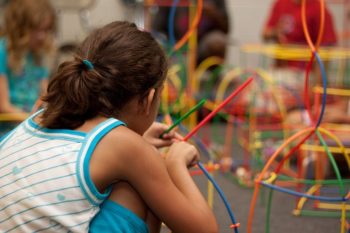 How You Can Support Your Children’s Project Homework
How You Can Support Your Children’s Project Homework
Teachers must evaluate what types of homework assignments will best support students’ learning outside of the classroom. Typically, many teachers assign homework that includes the following reading comprehension and reflection activities:
- Math review worksheets and flash cards
- Social studies, history, and civics research topics
- Science experiments that can be performed at home
- Field trips to local sites of historical and/or current significance with comprehension questions
Types of Projects
Although the homework plan may assume scheduled activity throughout the week, most children cram homework activity into an already hectic weekly school schedule. A new approach to homework is engaging students and their families in longer term project-based learning activities. The purpose of these homework projects is to help families integrate educational family activities into their daily lives. Activities can encompass Common Core State Standards and STEAM concepts in a relaxed and flexible home environment. When play becomes learning, your children can complete homework assignments with more enthusiasm. They will learn critical thinking skills while integrating grade-level Common Core State Standards and STEAM activities into their daily lives. A sample reflective homework worksheet is included below.
Sample Homework Activity Worksheet
Proposed Project:As a third-grade student, I will construct a 9” x 12” birthday card for my brother that will include: 1. Photos of my brother visiting various historical points of interest with captions of historical data. 2. A layout plan illustrating how photos were cut and measured to fit with the photo captions and space for the birthday sentiment. 3. A poetic verse or birthday sentiment that encompasses the photos and historical data used when designing the card. 4. A finalized card, layout plan, and completion of the sample learning activity worksheet.
|
Nightly Activities to Support the Project:1. Monday: Select the pictures for the card. 2. Tuesday: Research historical data for photo captions. 3. Wednesday: Create a layout of the pictures for the card. 4. Thursday: Assemble the card and create the birthday sentiment. 5. Friday – Monday: Complete the worksheet by answering anticipated outcomes, observed results, and relevant Common Core Standards. Share my project and worksheet with my parents and ask them to reflect on what they have learned. 6. Tuesday: Share the card and worksheet with my class in the bi-weekly presentation of project-based learning activities at home.
|
Anticipated Outcomes:I will learn how to create a greeting card for my brother’s birthday. I will learn more about the places we visited on vacation and will learn which Common Core Standards relate to this project.
|
Observed Results of the Project:I was surprised how much work it took to measure and create a layout with the different pictures selected for my brother’s card. I learned more history about the sites we visited. I liked writing the birthday sentiment.
|
Relevant Common Core Standards to Support the Activity:CA Grade 3 Writing: Conduct short research projects that build knowledge about topic; recall information about experiences and gather information from print and digital sources; take brief notes on sources and sort evidence into provided categories. CA Grade 3 Mathematics: Geometric measurement – understand concepts of area and relate area to multiplication and to addition.
|
Learning Reflections:When I shared my creation with my mom, she was impressed how I completed the project and my creativity. She is going to teach me how to design layouts and research data for our family vacation photo album.
|
How to Help Our Children
Through project-based learning activities at home, you and your children will be able to understand how daily activities reinforce specific academic standards. These experiences can help your children’s teachers can learn how to expand relevant learning activities outside the classroom.
Much success with homework projects!
Mary Ann
Copyright © 2019 by GenParenting

Mary Ann Burke, Ed.D., Digital Education Expert, is a substitute distance learning teacher for Oak Grove School District in San Jose, California and the author of STUDENT-ENGAGED ASSESSMENT: Strategies to Empower All Learners (Rowman & Littlefield: 2020). Dr. Burke creates digital language arts and substitute teaching K – 12 activities for teachers and parents. She is the Cofounder of the Genparenting.com blog. Burke is the former Director II of Categorical & Special Projects for the Santa Clara County Office of Education that supports 31 school districts serving 272,321 students in Santa Clara County. She is also a previous Director – State & Federal Compliance for Oakland Unified School District, the former Director – Grantwriter for the Compton Unified School District, and was the initial VISTA Director for the Community Partnership Coalition in southern California. Much of her work focuses on creating innovative digital trainings and partnership programs for teachers and families to support students’ learning. These programs were featured as a best practice at a National Title I Conference, California’s Title I Conferences, AERA Conferences, an ASCD Conference, the NASSP Conference, and statewide educator conferences.

